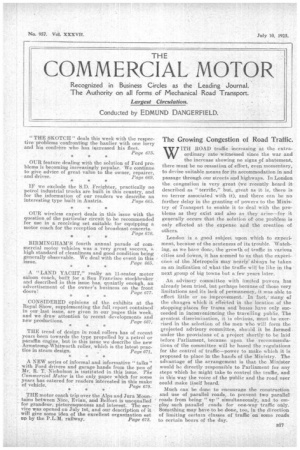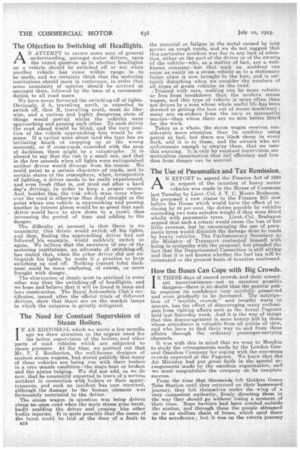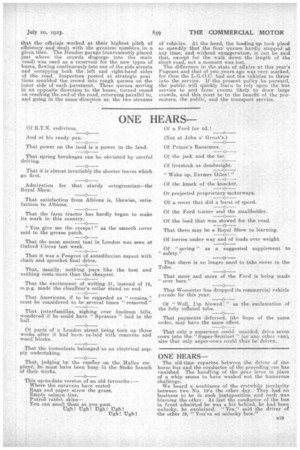The Growing Congestion of Road Traffic.
Page 1

Page 2

Page 3

If you've noticed an error in this article please click here to report it so we can fix it.
WITH ROAD traffic increasing at the extraordinary rate -witnessed since the war and the increase showing no signs of abatement, there must be no cessation. of effort, evenmomentary, to devise suitable means for its accommodation.in and passage through our streets and highways. In London the congestion is very great (we recently heard it described as " terrific," but, great as it is, there is no tenor associated with it), and there can be no further delay in the granting of powers to the Ministry of Transport to enable it to deal with the problems as they exist and also as they arise—for it generally occurs that the solution of one. problem is only effected at the expense and the creation of others.
London is .a good subject upon which to experiment., because of the acuteness of its trouble. 'Watching, as We have done, the growth of traffic in various cities and towns, it has seemed to us that the experienue. of the Metropolis may nearly always be taken as an .indication of what the traffic will be like in the next group of big towns but .a' few years later.
. An advisory committee with limited powers has already been tried, but. perhaps because of those very limitations and its lack of permanency, it was able to effect little or no improvement.' .In fat, many 6£ the changes which it effected in the location of the stopping-places for trains and buses have only succeeded in inconveniencing the travelling public. The greatest discrimination, it is obvious, must be exercised in the selection of the men who will form the projected advisory committee; should it be formed under the provisions of a project shortly to be laid before Parliament, because upon the recommendations of the committee will be based the regulations for the control of traffic—power to make which it is proposed to place in the hands of the Ministry. The advantage of the arrangement is that the •Minister would be directly responsible to Parliament for any steps which he might take to control the traffic, and in this way the voice of the public and the road user could make itself heard.
Much can be done to encourage the construction and use of parallel roads, to prevent two parallel roads from' being " up " simultaneously, and to employ. such parallel roads for one-way traffic only. Something may have to be done, too, in the direction of limiting certain classes of traffic on *some roads to certain hours of the day.
The Objection to Switching off Headlights.
AN ATTEMPT to secure some sore of general understanding, amongst motor drivers, upon the vexed question as to whether headlights on a vehicle should be switched off or not when another vehicle has come within range is _to be made, and we certainly think that the motoring institutions should meet in conference, in order that some unanimity of opinion should be arrived at amongst them, followed by the issue of a recommendation to all road users.
We have never favoured the switching-off of lights.. Obviously, if A, travelling north, is expected to switch off, then B, travelling south, must do likewise, and a curious and highly dangerous state of things would prevail whilst the vehicles were approaching and passing each other. To each driver the road ahead would he blind, and the very position of the vehicle approaching him would be obscure. If a cyclist were about (and the type has an irritating knack of cropping up at the wrong moment), or if cross-roads coincided -with the area of darkness, there might be a catastrophe. It is absurd to say that the risk is a small one, and that in the few seconds when all lights were extinguished neither driver would diverge from his course. We could point to a certain character of roads, and to certain states of the atmosphere, when, irrespective of lighting, a driver needs to be really experienced, and even fresh (that. is, not tired out after a hard day's driving), in order to keep a proper course. And, besides this, the risk which must occur whenever the road is otherwise than dead straight at the point where one vehicle is approaching and passing another in intense gloom would be so great that each driver would have to slow down to a crawl, thus increasing the period of time and adding to the danger.
The difficulty at present is that there is no unanimity. One driver would switch off his lights, and then, finding the approaching driver had not followed his example, would suddenly switch on again. We believe that the secretary of one of the motoring institutions, an advocate of switching-off, has stated that, when the other driver did not, extinguish his lights, he made it a practice to keep switching on and off. Nothing (except total darkness) could be more confusing, of course, or more fraught with danger.
The elimination of dazzle must be attained in some other way than the switching-off of headlights, and we hope and believe that it will be found in lamp and lens construction. The Royal Automobile Club's certificates, issued after the official trials of different devices, show that theee are on the market lamps in which the nuisance is greatly mitigated_
The Need for Constant Supervision of Steam Boilers.
IN AN EDITORIAL which we wrote a few months ago we drew attention to the urgent need for the better supervision of the boilers and other parts of road vehicles which are subjected to steam pressure. At the time, we pointed out that Mr. F. J. Bretherton, the well-known designer of modern steam wagons, had stated publicly that many of these vehicles are being run with their boilers in a very unsafe condition—the stays bent or broken and the plates bulging. We did not add, as we do now, that he constantly expected to learn of a serious accident in connection with boilers or their appurtenances, and such an incident has now occurred, although the damage to the human element was fortunately restricted to the driver.
The steam wagon in question was being driven along an open road when the main steam pipe burst, badly scalding the driver and causing him other bodily injuries. It is quite possible that the cause of the burst could be laid at the door of a fault in B18 the material or fatigue in the metal caused by long service on rough roads, and we do not suggest that this particular accident was due to any lack of attention, either on the part of the driver or of the owners of the vehicle—who, as a matter of fact, are a wellknown company—but that such an accident can occur as easily on a steam vehicle as in a stationary boiler plant is now brought to the fore, and is certainly disturbing when we consider the numbers of all types of steam vehicles on the road.
. Treated with care, nothing can be more reliable or free from breakdown than the modern steam wagon, and this type of vehicle is more often than not driven by a man whose whole useful life-has been devoted to getting the best out of steam machinery ; -many are ex-stokere from the navy or mercantile marine—than whom there are no men better fitted for the work.
Taken as a whole, the steam wagon receives considerably more attention than its confrere using petrol as fuel, but there are black sheep in every flock, arid it is to these, and the owners who are unfortunate enough to employ them, that we issu( this warning. It Is only by constant supervision an meticulaus examination that full efficiency and free dom from danger can be assured.
The Use of Pneumatics and Tax Remission.
N EFFORT to amend the Finance Act of 1920 in respect of the taxation of heavy motor vehicles was made in the House of Commons last Tuesday by Lieut.-Col. J. T. C. Moore Brabazon. He proposed a new clause to the Finance Bill now before the House which would have the effect of reducing by 50 per cent, the duties payable by vehicles exceeding two tons unladen weight if they were fitted wholly with pneumatic tyres. Lieut.-Col. Brabazon argued that such a rebate would cause the loss of but little revenue, but by encouraging the use of pneumatic tyres would, diminish the damage done to roads by heavy vehicles. The Parliamentary Secretary to the Ministry of Transport contented himself with being in sympathy with the proposal, but pleaded the fact that the Departmental Committee is still sitting and that it is not known whether the fuel tax will be reinstated or the present basis of taxation continued.
How the Buses Can Cope with Big Crowds.
IN THESE days of record crowds and their attendant inconveniences—not to mention possible dangers—there is no doubt that the general public requires its confidence very carefully preserved and even gradually to be increased. The anticipation of "terrible crowds" and lengthy waits in queues, has the effect of discouraging many enthusiasts from visiting affairs such as the Aerial Pageant held last Saturday week. And it is the way of things that this discouragement is more keenly felt by those whose attendance is valuable from' all points of view, and who, have to find their way to and from these affairs through the ordinary passenger-carrying channels.
It was with this in mind that we went to Hendon to study the arrangements made by the London General Omnibus Company for coping with the enormous crowds expected at the Pageant. We knew that the Air Ministry had put great faith in the special arrangements made by the omnibus organization, and we must congratulate the company on its complete succe SS.
From the time that thousands left -Golders Green Tube Station until they returned on their homeward journey, they felt themselves under the wing of a very competent authority, firmly directing them in the -way they should go without Losing a moment of their time. Rope harriers had been erected outside the station, and through these the people stkeamed• on to an endless chain of buses, 'which sped them to the aerodrome; but it was on the return journey
that the officials worked at their highest pitch of efficiency and dealt with the greatest numbers in a given time. The Hendon garage (conveniently placed just where the crowds disgorge into the main road) was used as a reservoir -for the new types of buses, flowing continuously into one of the side streets and occupying both the left and right-hand sides of the road. Inspectors posted at strategic positions moulded the crowd into rough queues on the inner side of each pavement. These queues moving in an opposite direction to the buses, turned round on reaching the end of the road, returning parallel to, and going in the same direction as. the two streams of vehicles. At the head, the loading-up took place' so speedily that the four queues hardly stepped at any time, and without exaggeration, it can be said that, except for the walk down the length of the short road, not a moment was lost.
The difference in the state of affairs at this year's Pageant and that of two years a-go was very marked, for then the L.G.0.0. had not the vehicles to throw into the service. If the present policy be pursued, thepublic will quickly learn to rely ,upon the bus service to and from events likely to draw large crowds, and this must be to the benefit of the promoters, the public, and the transport service.




























